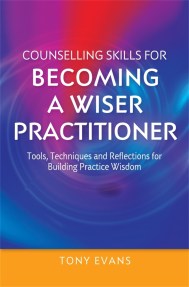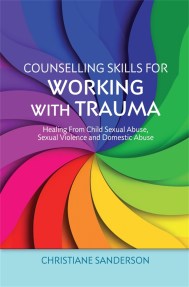Counselling Skills for Working with Shame helps you to understand and identify shame and to build shame resilience in both the client and yourself.
Written in an accessible style, this is a hands-on, skills-based guide which helps practitioners to identify what elicits, evokes or triggers shame. It gives a general introduction to the nature of shame in both client and counsellor and how these become entwined in the therapeutic relationship. It focuses on increasing awareness of shame and how to release it in order to build shame resilience.
With points for reflection, helpful exercises, top tips, reminders and suggestions for how to work with clients, this is a highly practical guide for counsellors, therapists and related professionals.
Written in an accessible style, this is a hands-on, skills-based guide which helps practitioners to identify what elicits, evokes or triggers shame. It gives a general introduction to the nature of shame in both client and counsellor and how these become entwined in the therapeutic relationship. It focuses on increasing awareness of shame and how to release it in order to build shame resilience.
With points for reflection, helpful exercises, top tips, reminders and suggestions for how to work with clients, this is a highly practical guide for counsellors, therapists and related professionals.
Newsletter Signup
By clicking ‘Sign Up,’ I acknowledge that I have read and agree to Hachette Book Group’s Privacy Policy and Terms of Use
Reviews
Working through chronic shame, while intense and uncomfortable, can be incredibly worthwhile for people, and their counsellors. Sanderson has used extensive reading and clinical experience to develop a resource that will help counsellors, and I suspect their clients, to work with shame, rather than avoiding it. This book will also help well-intentioned but unaware counsellors prevent the loss of clients through inadvertently re-shaming them. Sanderson provides a myriad of tips to help us all navigate the mortifying and isolating effects of toxic shame. And in doing so, will help us move towards a more compassionate way of being, both to ourselves, and to others.
Jung said 'Shame is a soul eating emotion'. Sanderson through this publication deconstructs shame and its crippling implications. She gives purpose to shame itself, providing food for thought and practical hints, tips and exercises to use for those brave enough to look into their own souls and those with whom they share a journey. This book is a must-have for all professionals and anyone who has ever felt shamed.
Counselling Skills for Working with Shame provides a comprehensive understanding of shame as encountered in the clinical setting. It is theoretically sound, well researched, up to date, and brimming with creative suggestions for therapeutic intervention. The book also skilfully prompts the reader to engage in self-reflection. The author is to be commended for her endeavours to translate shame theory into sound therapeutic application across a broad sweep of clinical manifestations. This book stands out from most other shame texts in its deeply considered application to the clinical situation, including supervision. It would be a valuable addition to the bookshelf of every counsellor, psychologist and psychotherapist engaged in clinical work.
This book is a significant contribution not only to the literature on shame but how those working with clients and others can harness this powerful emotion to facilitate recovery. Christiane Sanderson's thought provoking book enables practitioners to understand shame and how this can be distinguished from other social emotions. This is not an easy task and Christiane has drawn on her considerable knowledge and skill as an academic and practitioner to provide a book that not only contributes to the debate 'what is shame and how can it be distinguished from other social emotions' but also how to work, across a wide range of clinical spheres, into utilizing such an emotion to the good. We are privileged to have Christiane working in our department.



